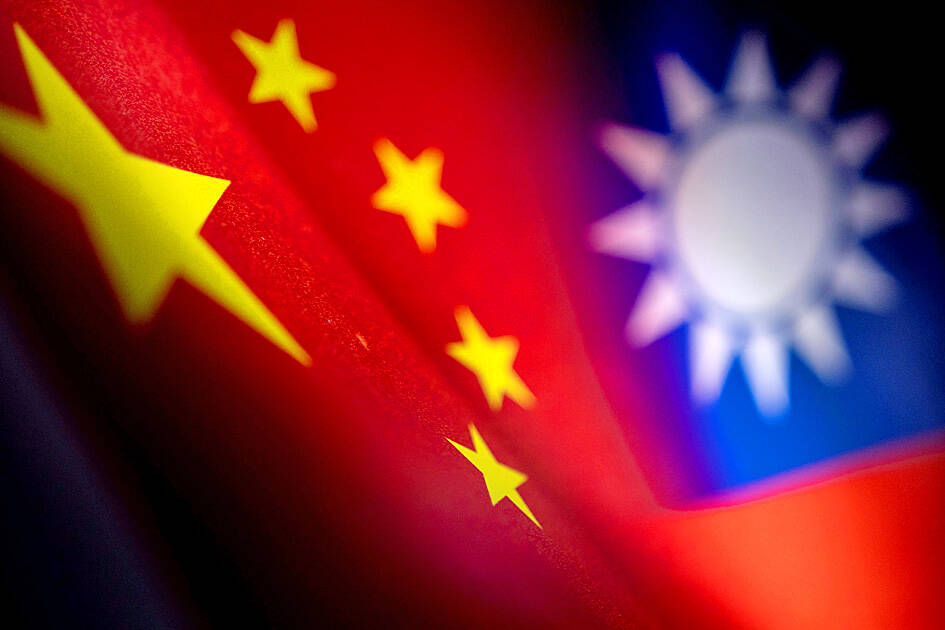Chinese Nationalist Party (KMT) caucus whip William Tseng (曾銘宗) yesterday said that Chinese state media had taken a phrase from the so-called “1992 consensus” out of context, after a state-run newspaper published an article on Saturday saying there could be no other interpretation of “China.”
The “1992 consensus” — a term that former Mainland Affairs Council chairman Su Chi (蘇起) in 2006 admitted making up in 2000 — refers to a tacit understanding between the KMT and the Chinese Communist Party (CCP) that both sides of the Taiwan Strait acknowledge that there is “one China,” with each side having its own interpretation of what “China” means.
The Ren Min Zheng Xie Bao, to mark the 30th anniversary of the Hong Kong talks — where the consensus was supposedly reached between representatives of Taiwan’s Straits Exchange Foundation and China’s Association for Relations Across the Taiwan Straits — on Saturday said that some senior members of the KMT in the past few years had sought to change the meaning of the term “1992 consensus.”

Photo: Reuters
The “1992 consensus” and “one China with different interpretations” both exist, Tseng said, adding that the KMT refused to accept singling out either part of the consensus, and neither would Taiwanese.
Democratic Progressive Party Legislator Wang Ting-yu (王定宇) said that Beijing’s stance was “a real slap in the KMT’s face.”
The KMT insists on the existence of the consensus, trying to deceive Taiwanese into thinking that the two sides of the Strait have their own interpretations of what “China” means, he said.
However, Beijing considers maintaining the “status quo” by using the names “Republic of China” or “Taiwan” as advocating for Taiwanese independence, he said.
For Beijing, there is only one China and one interpretation of it, he added.
Chinese media are bound by law to serve the CCP’s interests, and the article would have been reviewed by the Publicity Department of the CCP, he said.
China’s recent moves have made its ambition to annex Taiwan increasingly clear, while also showing that it does not care for the KMT, he said.
If KMT members “still have brains and a conscience,” they should accept that Taiwanese are facing China’s threats, he said.
“Only by protecting Taiwan can we resist China” and protect Taiwan’s democracy, freedom and economy, he added.

INVESTIGATION: The case is the latest instance of a DPP figure being implicated in an espionage network accused of allegedly leaking information to Chinese intelligence Democratic Progressive Party (DPP) member Ho Jen-chieh (何仁傑) was detained and held incommunicado yesterday on suspicion of spying for China during his tenure as assistant to then-minister of foreign affairs Joseph Wu (吳釗燮). The Taipei District Prosecutors’ Office said Ho was implicated during its investigation into alleged spying activities by former Presidential Office consultant Wu Shang-yu (吳尚雨). Prosecutors said there is reason to believe Ho breached the National Security Act (國家安全法) by leaking classified Ministry of Foreign Affairs information to Chinese intelligence. Following interrogation, prosecutors petitioned the Taipei District Court to detain Ho, citing concerns over potential collusion or tampering of evidence. The

NEGOTIATIONS: Taiwan has good relations with Washington and the outlook for the negotiations looks promising, Minister of Economic Affairs J.W. Kuo said Taiwan’s GDP growth this year is expected to decrease by 0.43 to 1.61 percentage points due to the effects of US tariffs, National Development Council (NDC) Minister Paul Liu (劉鏡清) said at a meeting of the legislature’s Economics Committee in Taipei yesterday, citing a preliminary estimate by a private research institution. Taiwan’s economy would be significantly affected by the 32 percent “reciprocal” tariffs slapped by the US, which took effect yesterday, Liu said, adding that GDP growth could fall below 3 percent and potentially even dip below 2 percent to 1.53 percent this year. The council has commissioned another institution

TRADE: The premier pledged safeguards on ‘Made in Taiwan’ labeling, anti-dumping measures and stricter export controls to strengthen its position in trade talks Products labeled “made in Taiwan” must be genuinely made in Taiwan, Premier Cho Jung-tai (卓榮泰) said yesterday, vowing to enforce strict safeguards against “origin laundering” and initiate anti-dumping investigations to prevent China dumping its products in Taiwan. Cho made the remarks in a discussion session with representatives from industries in Kaohsiung. In response to the US government’s recent announcement of “reciprocal” tariffs on its trading partners, President William Lai (賴清德) and Cho last week began a series of consultations with industry leaders nationwide to gather feedback and address concerns. Taiwanese and US officials held a videoconference on Friday evening to discuss the

NEGOTIATIONS: The US response to the countermeasures and plans Taiwan presented has been positive, including boosting procurement and investment, the president said Taiwan is included in the first group for trade negotiations with the US, President William Lai (賴清德) said yesterday, as he seeks to shield Taiwanese exporters from a 32 percent tariff. In Washington, US Trade Representative Jamieson Greer said in an interview on Fox News on Thursday that he would speak to his Taiwanese and Israeli counterparts yesterday about tariffs after holding a long discussion with the Vietnamese earlier. US President Donald Trump on Wednesday postponed punishing levies on multiple trade partners, including Taiwan, for three months after trillions of US dollars were wiped off global markets. He has maintained a 10 percent